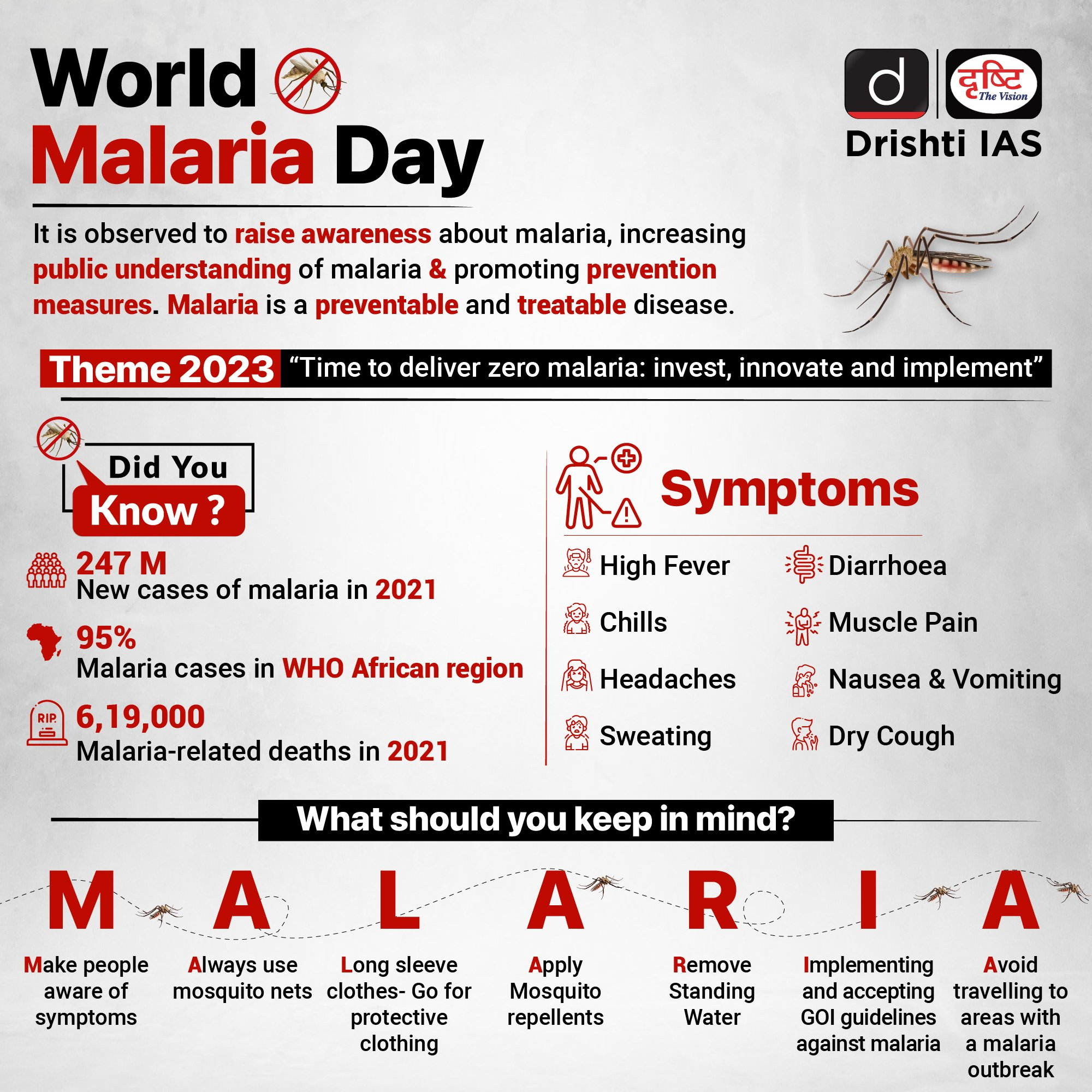Important Facts For Prelims
Genetically Modified Mosquitoes to Fight Against Malaria
- 01 Jun 2024
- 5 min read
Why in News?
Djibouti, a nation in East Africa, is taking a bold step in the fight against malaria by deploying genetically modified (GM) mosquitoes.
- This pilot program, launched in May 2024, marks a significant moment in the battle against this deadly disease.
Why Genetically Modified (GM) Mosquitoes for Malaria Control?
- About:
- GM mosquitoes are bred in a lab with two genes: a self-limiting gene to prevent female offspring from surviving to adulthood, and a fluorescent marker gene for identification in the wild.
- GM mosquitoes are engineered to reduce the population of female Anopheles stephensi mosquitoes, which are responsible for transmitting malaria.
- By targeting the vector population, the aim is to interrupt the transmission cycle of malaria.
- Need of GM Mosquitoes:
- Surge in Malaria Cases: Djibouti has witnessed a dramatic rise in malaria cases in recent years. An invasive mosquito species (migrated to Africa from South Asia and the Arabian Peninsula), Anopheles stephensi, particularly adept at thriving in urban environments like Djibouti City.
- Limitations of Traditional Control Methods: Existing control methods like insecticide-treated bed nets and indoor spraying are becoming less effective due to mosquito resistance.
- Working Mechanism:
- Targeting the Females: The released mosquitoes are all male and carry a self-limiting gene. When they mate with female A. stephensi mosquitoes, their offspring (which would be female) inherit the gene and are unable to survive to adulthood.
- Over time, this process aims to significantly reduce the overall population of female mosquitoes, thereby interrupting malaria transmission.
- Environmental Concerns: Some environmental groups have expressed concerns about the potential unintended consequences of releasing GM mosquitoes into the ecosystem.
- GM mosquitoes may develop unforeseen survival skills or adaptability. Like resistance seen in Bt cotton, GM mosquitoes could evolve resistance to gene-editing mechanisms, posing challenges to their effectiveness.
- Mosquitoes contribute to pollination by consuming nectar, which could impact plants reliant on them.
- A decrease in mosquito populations could disrupt local food webs and biodiversity.
Note:
- GM mosquitoes have been successfully used in parts of Brazil, the Cayman Islands, Panama, and India to control Aedes aegypti mosquitoes. Since 2019, over 1 billion mosquitoes have been released.
- Djibouti's initiative follows Burkina Faso's release of GM mosquitoes in West Africa, highlighting a growing trend in using biotechnology to combat malaria.
Malaria
- Malaria is a life-threatening disease caused by the Plasmodium parasite, transmitted through the bites of infected female Anopheles mosquitoes.
- It is most common in tropical and subtropical regions, with symptoms including fever, chills, headache, and fatigue. Severe cases can lead to organ failure, coma, and death.
- India is implementing various initiatives to control vector-borne diseases, particularly malaria. These efforts include the National Vector-Borne Disease Control Programme, the National Malaria Control Programme, the National Framework for Malaria Elimination 2016-2030.
Read more: Genetically Modified Mosquitoes
UPSC Civil Services Examination, Previous Year Question
Q. Consider the following statements: (2017)
- In tropical regions, Zika virus disease is transmitted by the same mosquito that transmits dengue.
- Sexual transmission of Zika virus disease is possible.
Which of the statements given above is/are correct?
(a) 1 only
(b) 2 only
(c) Both 1 and 2
(d) Neither 1 nor 2
Ans: (c)
Q. Widespread resistance of malarial parasite to drugs like chloroquine has prompted attempts to develop a malarial vaccine to combat malaria. Why is it difficult to develop an effective malaria vaccine? (2010)
(a) Malaria is caused by several species of Plasmodium
(b) Man does not develop immunity to malaria during natural infection
(c) Vaccines can be developed only against bacteria
(d) Man is only an intermediate host and not the definitive host
Ans: (b)





